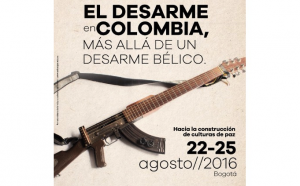FREE FLOW OF INFORMATION
Statement from International Peace Bureau
At the International Peace Bureau Conference DISARMAMENT IN COLOMBIA: BEYOND WAR, TOWARD THE CONSTRUCTION OF CULTURES OF PEACE (Prepcomm for Berlin Congress Disarm! For a Climate of Peace) organized in cooperation with the University El Bosque and other partners, attendees received with joy the news of the signing of the final peace agreement between the Government and the FARC – EP.

Click on image to enlarge
This is undoubtedly the most important historical event in the recent history of Colombia. It is the triumph of dialogue over weapons, after more than 50 years of armed struggle, in which neither the FARC nor the government won a victory by military means. It left behind many victims among not only the warring parties, but also mainly civil society, as well as damage to the environment and the national infrastructure, and with serious impacts on culture and the national imagination. It took four years of negotiation and dialogue to achieve what was not achieved by force of arms.
In this period, parallel to the war and the various forms of violence that hit the country, movements of resistance and of peace building also emerged, which allowed communities, despite pain and death, to survive and create a future. It is ALSO thanks to them and pressure from sectors of civil society that the fighting ends, due to their persistence in insisting that the ways of force and violence will not lead to peace.
This agreement is an important step towards peace. It means the abandoning of weapons, which is undoubtedly very important, but this process has to continue in order to reach an agreement also with ELN – Ejército de Liberación Nacional and other insurgent groups. The next step is the ratification of the agreement by the whole population in a plebiscite that will happen on 2 October. The third and most important step is undoubtedly the implementation of the agreements. The land reforms, the incorporation of former combatants into civil society; the quest for a more just and equitable society; the structural changes that guarantee human rights for all people, including the indigenous and the afro-Colombian communities; the cultural changes that allow people to recognize, respect and value differences; and finally reconciliation, forgiveness and guarantees of non-repetition.
The challenges involve first the state and the government as well as the FARC and major institutions, the church, academia, the trade unions and civil society as a whole. Implementing the agreements is a task that starts from the various localities and regions, recognizing the progress they have made, and the resistance that has created the life and strength that is needed today. Then comes the commitment of all citizens of the country. We urge that those Colombians now somewhat skeptical of the Havana agreement overcome their reservations and fully join in developing our potentials and dreams so that Colombia can become a country based on the ideals of a culture of peace.
We join Facundo Cabral, the Argentinean singer, in saying: This is a new day to start again …with hope, dreams, work and action.
(Thank you to Amada Benavides for sending this to CPNN)